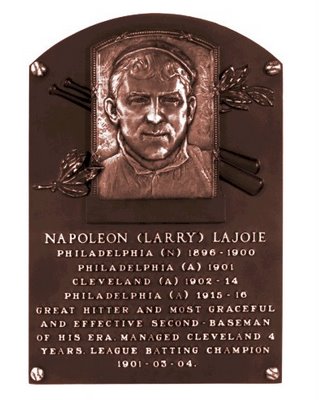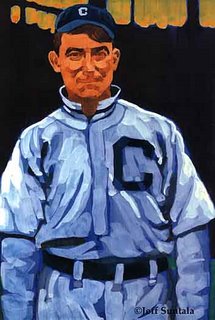 .
.From today's New York Times Corrections :
Because of an editing error, a sports article yesterday about the family of Xavier Nady, who is a contender for the Mets' right-field job, misstated the birthplace of the Hall of Famer Nap Lajoie. It was Rhode Island, not France.
Normally, this is where I blast the dunderheads at the Gray Lady for not doing even a modicum of basic research before blabbing out something completely wrong. But not today. Because it really doesn't matter where Napoleon Lajoie was born. As far as baseball is concerned, he was born at second base.
Nap Lajoie was one of the all-time great hitters of the dead ball era. (This was roughly 1900-1920 before they juiced up the ball for Babe Ruth in order to win fans back to a game tarnished by the 1919 Black Sox scandal.) In those days, home runs were an oddity. The game was all about "small ball" - base hits, bunts and steals - and a team needed a patient slugger to move the base runners along.
Nap was perfect in that role. In 1901, his debut year with the Philadephia Athletics of the brand new American League, he led the league in hits (229), doubles (48), home runs (14), runs scored (145), and RBI (125). His batting average that year was an astonishing .422 . No player since Ty Cobb has ever come close to matching that American League record. (Nap's arch nemisis, Cobb, hit .420 in 1911, but never came close again.)
In 1910 Lajoie was in a hitting duel with Cobb that has become part of baseball lore. As reported by the Baseball Library :
But Lajoie wasn't just a slugger, he was an outstanding second baseman - maybe the best defensive player ever at that position. He also was, apparently, and unlike Cobb, a pretty decent guy on the field.The 1910 batting title was hotly contested, with a Chalmers automobile to go to the leading batter. Most of the baseball world rooted for the popular Lajoie and against the hotheaded Cobb, who had won the three previous titles. On the final day of the season, Lajoie bunted for seven infield hits and swung for a triple in a doubleheader at St. Louis. St. Louis manager Jack O'Connor was ultimately fired when it was revealed that he had ordered his third baseman to play deep against Lajoie. Lajoie finished second by a point despite the machinations but received an auto anyway. Later historical research by The Sporting News revealed Lajoie 's .384 average actually should have won the title. Cobb's official average of .385 was inflated because one of his games was inadvertently counted twice. In a dispute that rose to the highest baseball levels, Commissioner BowieKuhn ruled in 1981 that the mistake would not be corrected.
In 1937, Nap was the first second baseman to be inducted into the Baseball Hall of Fame, the sixth player ever to be added to that shrine. The year prior was the first ever ballot to the Hall, and the sports writers selected the following (in order of percentage of votes received): Ty Cobb, Babe Ruth, Honus Wagner, Christy Mathewson, and Walter "Big Train" Johnson. Nap Lajoie was next in that balloting, 24 votes shy of the prize. He led the class of 1937, however, winning more votes than both the legendary Red Sox slugger Tris Speaker and that forever famous hurler, Cy Young. All this, despite never having played on a championship team."What a ball player that man was! Every play he made was executed so gracefully that it looked like it was the easiest thing in the world. He was a pleasure to play against, too, always laughing and joking. Even when the son of a gun was blocking you off the base, he was smiling and kidding with you. You just had to like the guy." — Tommy Leach
One day, maybe soon, I'll post something about the legal battles that Nap faced in trying to break baseball's infamous "reserve clause" and his place in cementing the American League as an equal to the older, more powerful National League.
But not today. Today is just about remembering a little piece of that grand game our fathers so adored, and about the men who made it part and parcel of an American life. I owe the Times a big one for jogging that memory out of of me on an otherwise forgettable Wednesday in March.
 When the big scorecard gets signed, let it read that one hundred and ten years ago, Napoleon Lajoie, from Woonsockett, Rhode Island, picked up a baseball glove and played himself into American history.
When the big scorecard gets signed, let it read that one hundred and ten years ago, Napoleon Lajoie, from Woonsockett, Rhode Island, picked up a baseball glove and played himself into American history.The French should be so proud.
8 comments:
Very nice, mr rdr.
And now, because I am a ditz, I am going to reveal my stunning ignorance of things sporting.
I saw two things I did not understand (bolded). You don't have to explain them if you don't want to. I just didn't understand the gist of this:
St. Louis manager Jack O'Connor was ultimately fired when it was revealed that he had ordered his third baseman to play deep against Lajoie. Lajoie finished second by a point despite the machinations but received an auto anyway....
Not a problem, Cass.
When a manager orders his third baseman to "play deep," the player drops back out of the infield dirt into the outfeiled grass. This would not be an uncommon thing to call when faced with a right-handed batter with a tendency to "pull" the ball, like Lajoie. (To "pull" a ball means that the batter's swing is already near the top of the arc, the power part of the stroke, when the ball arives at the plate, and transfers maximum power which send sthe ball, for a righthander, deep down the left field line, where the third baseman is standing.) Particularly in the dead ball era, a batter could drop a shot squarely between the third baseman and the left fielder, thereby coasting into first or easily stretching the hit to 2 bags.
But when the coach orders his third baseman to play deep, it leaves a wide open area between home plate and third base for the batter to lay down a bunt. The third baseman is too far back to chrge in and make the play, and the pitcher is almost always too slow (because he just came out of his wind-up). Thus, the charge laid against the manager was that after Lajopie had already bunted aboard, not once, but twice, he should have brought his third baseman in to cover the line. That he didn't smelled to all like he was trying to help Lajoie beat the hated Cobb for the batting title. Perhaps he was, but Lajoie also knocked a 3-bagger that day, and wound up with a .384 average to Cobb's 385. As with all things baseball, it took only 61 years to clear it up.
As far as the autos goes, I'm sure the Chalmer's automobile company thought that it might be prudent to award both Cobb and Lajoie a car for their performances, rather than simply present the despised Cobb another trophy. Even then, marketing was everyting.
Nice typing, eh?
Thanks for answering - typing doesn't faze me :)
Now I have to figure out what the heck you said! I have to sketch the third-home thing out because obviously I don't play baseball. I think I got it though.
A lot of this stuff doesn't stick the first time out with me because even though I played neighborhood ball with friends when I was a kid in Newport, I couldn't have cared *less* about the rules (hey, I'm left-handed). I just batted when they told me to, played in the outfield, tried not to get involved when the boys fought about stuff because I thought it was dumb.
I was just happy I didn't get picked last :D
More:
Robin Ventura: Third Base Tips
Ventura was the first major leaguer to hit grand slams in both games of a doubleheader. He is a six-time Gold Glove Award Winner. In 1987, he was the College Player of the Year. The following year, he won the Golden Spikes Award (nation's best amateur player), and was a member of the U.S. Olympic Gold Medal winning team.
"Properly positioning yourself is one of the most important aspects to your fielding game."
Position yourself as far back as you feel comfortable, but take into consideration how fast the batter runs to first.
If the batter has a reputation of bunting, try to get in close, and be ready for it.
When in a double play situation and a ground ball is hit toward the third base side, try to wait for the ball to get close enough to you and then start your movement towards second base. Catch it and throw it all in one movement.
If a runner on second is threatening to steal third, make sure that you keep an eye on him. If he attempts to steal third, wait as long as you can to see if the batter at home plate hits the ball. But try to be close enough to third to get to the base by the time the catcher throws it. You might want to cheat a little bit to third base to play it safe.
If a runner is rounding third base and heading home, and a ball is hit to the outfield, try to position yourself about 15 feet in from the grass. Make sure the runner touches third base, and also be on your toes for the ball coming in.
Actually, smart a$$, despite my lack of knowledge of the intricacies of the game, there is a reason I always got picked right in the middle, though I was the only girl in the neighborhood who turned out for the games.
I could bat tolerably well, and I was an aggressive runner who was quite good at stealing bases.
Pppppphhhhttt.
On the other hand, I considered myself to ba a truly lousy outfielder :)
Grrrrrl!
Yeah, I threw like one too. Can't really throw a football all that great unless I really concentrate either :)
Post a Comment